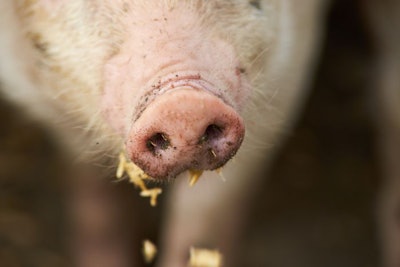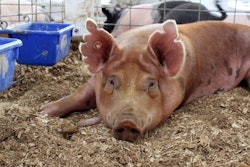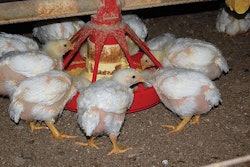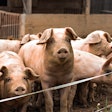
New research out of Kansas State University has confirmed that animal feed contaminated with African swine fever (ASF) virus can sicken swine, prompting scientists and industry leaders to call for caution among feed producers and importers.
The study, to be published in the journal Emerging Infectious Diseases in May, concluded that ASF virus “can easily be transmitted orally” and that the virus was especially infectious in liquid media. However, it’s not clear whether the transportation of feed is currently responsible for the spread of the virus; swine infected during the Kansas State University study ate small amounts of a plant-based feed that had been deliberately contaminated with the virus. Most outbreaks of ASF to date have been attributed to feeding contaminated pork products or to direct contact with swine, according to the study.
“The dose that was required to cause infection in liquid is very low,” pointing to the highly contagious nature of the virus, said lead author Megan Niederwerder, an assistant professor of diagnostic medicine/pathobiology at the Kansas State University College of Veterinary Medicine.
Previous studies had already established that ASF is “highly stable across a diverse range of feed ingredients,” Niederwerder said. This latest work, she said, confirms contaminated feed could sicken swine, although the amount of virus necessary to cause infection was higher in liquid media than in dry products.
While Niederwerder said she was not aware of any research verifying that ASF is circulating in animal feed products, she said the potential for risk should increase awareness of the need for feed biosecurity.
“So there’s comfort in some of this, and some continued need for concern,” said Paul Davis, director of quality, animal food safety and education for the American Feed Industry Association (AFIA).
Biosecurity protocol
Davis and Niederwerder said feed producers and handlers should update their biosecurity protocol. Davis also emphasized the importance of communicating these standards to others, per recent updates to the AFIA’s biosecurity guidelines. Producers should consider traffic flow on their farms — who’s coming in, and whether they have had contact with other farms — and should communicate with their feed supplier about where ingredients are sourced, as well as what steps are taken to mitigate risk.
AFIA is cofunding additional studies looking at whether storage conditions and holding times affect the spread of the virus. Another goal for future research, Niederwerder said, is to develop efficient tests capable of detecting ASF in animal feed, allowing producers to identify contamination before introducing it to their farms.
View our continuing coverage of the African swine fever outbreak.


















